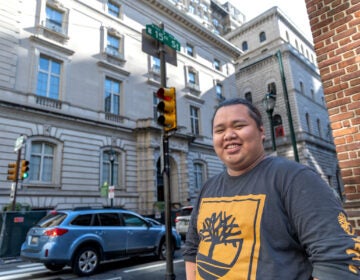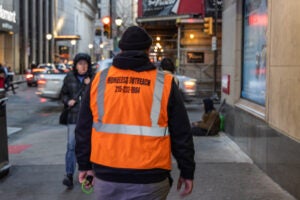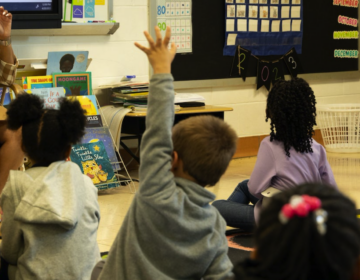2 Montco colleges want to help students facing food and housing insecurity. Will other suburban colleges join in?
Gwynedd Mercy University, Montgomery County Community College and several community partners teamed up and launched the College Student Basic Needs Program.
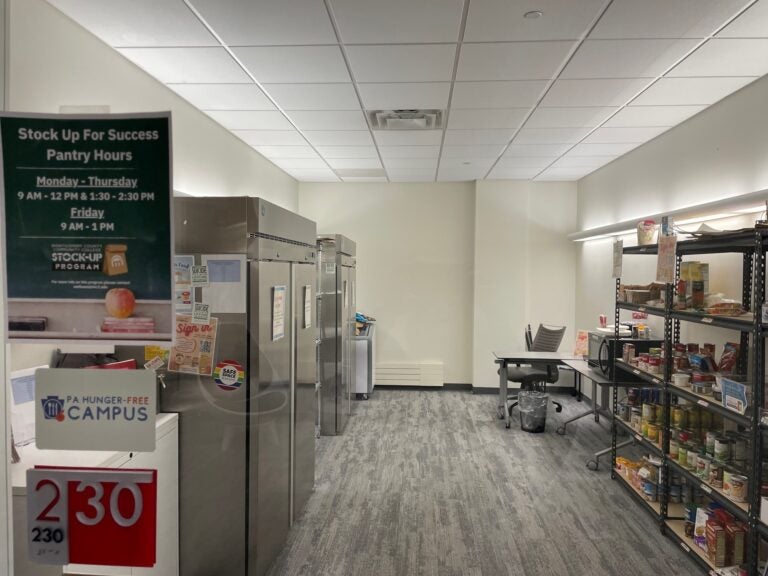
Stock Up for Success food pantry located at the Wellness Center of MCCC's Blue Bell Campus. (courtesy of Montgomery County Community College)
From Delco to Chesco and Montco to Bucks, what about life in Philly’s suburbs do you want WHYY News to cover? Let us know!
Montgomery County college students who are experiencing food and housing insecurity have a new lifeline.
Gwynedd Mercy University and Montgomery County Community College teamed up and introduced the College Student Basic Needs Program (CSBNP).
“The College Student Basic Needs Program helps under-resourced college students experiencing food and housing insecurity to stay in school, succeed academically, graduate and obtain better paying employment in the future,” said Wendy Gaynor, CSBNP’s inaugural executive director.
An affordable housing crisis, a growing population of unhoused youth and young adults and disputes over homeless encampments in places such as Norristown and Pottstown are among the growing problems in Montco. Advocates say the county’s need for a program such as this is greater than ever.
“As one might imagine, if you’re trying to cram for a bio exam, it’s really tough when you don’t know if you’re going to be able to pay next month’s rent,” Gaynor said.
John Kepner, a Gwynedd Mercy board member, first thought of the idea of CSBNP during a 2017 board meeting. He was reading a committee report detailing the difficulties students face securing stable housing and food.
Stunned, Kepner investigated the issue and reached out to officials at Montgomery County Community College. At the time, both colleges were already beginning their own food pantries. The cogs in Kepner’s head began to turn.
“It was just people coming together and thinking there’s this idea we can address and it’s easier to address collaboratively, and that’s proven to be the case,” Kepner said.
In order to justify a broader partnership, both the college and the university participated in a study to determine the obstacles facing their students.
“What we concluded was that there was kind of a perspective that this was just food, but we couldn’t just address food insecurity,” Kepner said. “We also had to address housing insecurity and the other basic needs that under-resourced students need in order to succeed.”
That’s when the partners decided to expand the list of collaborators. CSBNP now boasts a seven-member consortium, including Manna on Main Street, Pottstown Cluster of Religious Communities, Family Promise Montco, Montco Anti-Hunger Network and Your Way Home Montgomery County.
During the pandemic, the group obtained funding and made significant investments on their own campuses.
At Gwynedd Mercy University, a small residential building was dedicated to a new food pantry. The school built a ramp for students with disabilities so they could access the fully-functional food pantry. They also developed a housing scholarship fund.
Suzan Neiger Gould, executive director of Manna on Main Street, which has been providing services and food to the community since 1981, said the organization’s role in CSBNP is to allow a way for students to “shop” online. Manna uses a software called SmartChoice.
Students can order based on their individual or household needs. All of this is completely free.
“We use our food resources to put together their orders, for most college students, that’s about 60 pounds — their grocery orders. And then Manna delivers those orders to the colleges,” Neiger Gould said. “It is a huge need and it is a very hidden need and certainly it’s something that we see every day at Manna. But if you are out in the community, you have no idea who was experiencing food insecurity.”
To her, the beauty of SmartChoice — and CSBNP — is its discretion. Asking for help can be overwhelming.
“They’re able to take care of this without having to search it out and I think that is so important for people because everyone wants to be treated with dignity and both of these colleges have invested in this program because they know that need,” she said.
In 2021, Montgomery County Community College also began operating two Wellness Center locations at its Blue Bell and Pottstown campuses.
The Wellness Center provides 24/7 access to mental health services, scheduled counseling and food through its Stock Up for Success pantries.
“There was a growing concern and need for our students, for both their mental health and their needs around housing and food as well as some other non-academic needs,” said Dr. Nichole Kang, executive director of the Wellness Center.
Equipped with a sensory room, bean bag chairs, a vertical garden and cubbies, the Wellness Center in Pottstown is a place to relax and ask for help.
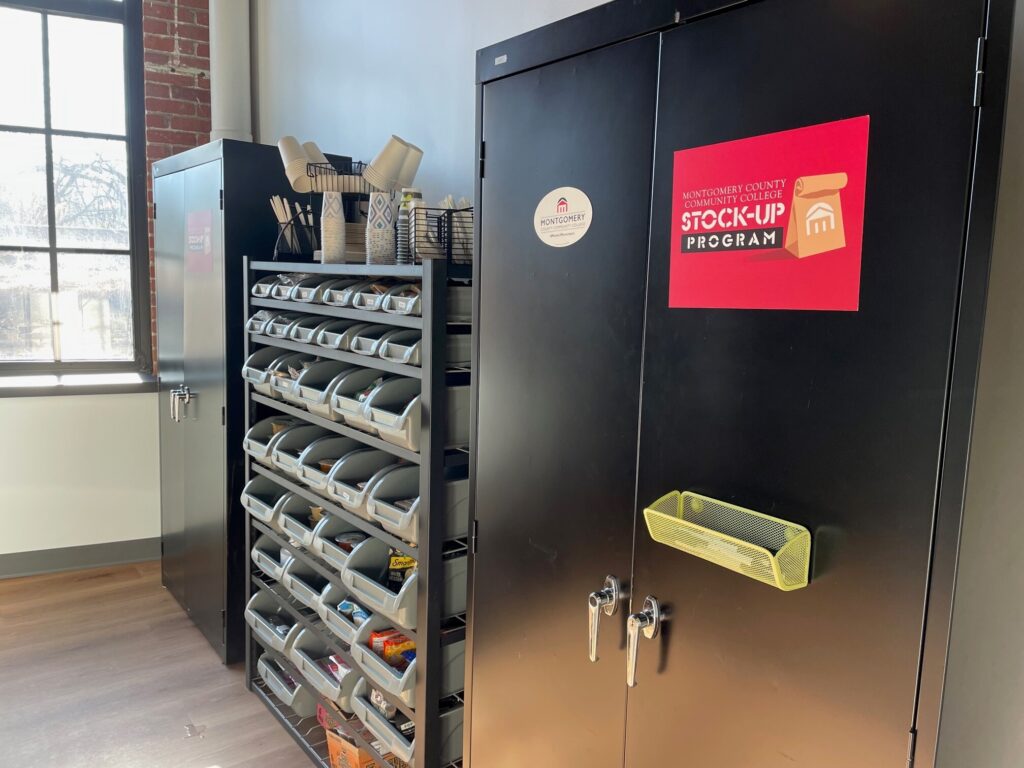
Kang said the center offers a “transformative experience.” In a given week, the staff serves 40 to 50 students through in-person visits, appointments and online sessions. Kang said they saved some people from failed semesters — and even evictions.
“They can get everything here with people that they trust, that they can form relationships with,” Kang said. “We have connections to their instructors, their academic advisors — so really, the whole campus is providing this wraparound experience and making sure that those students that could have fallen through the cracks before are getting the supports that they need.”
With these support structures already in place, Kepner said the investments that happened in “parallel” created a strong foundation for CSBNP.
“You can look at it as kind of an umbrella supplying additional services that they could better provide collaboratively than they could provide on their own,” Kepner said.
Goals and obstacles
The model, so far, is “fantastic,” said Gaynor, CSBNP’s leader. But she has bigger aspirations.
“You’ve got partner pantries throughout the county as well as two great universities to get us started, both in the college and then Gwynedd Mercy University,” she said. “I would love to see that expand to include a few more colleges and universities as well as a technical school.”
Gaynor also wants CSBNP to establish a student advisory board. Kepner said leaders are also pondering the possibility of CSBNP becoming a nonprofit entity.
Right now, both the college and the university are helping not just the students but their families. Kepner said an idea is in the works to address housing needs for students who are parents.
“We’re developing ideas for residential facilities for them that will take a little more time and funding to develop,” Kepner said.
While the initiative has largely managed to evade hiccups and roadblocks, the ever-present challenge of money remains a significant hurdle, Kepner said.
Jacqui Good, executive director of the Pottstown Cluster of Religious Communities, is a part of the core team exploring CSBNP’s potential evolution to nonprofit status. She said another obstacle facing the program is the high housing costs and the negative attitudes towards unhoused people.
“The housing situation is a little more complex because solving housing problems by definition is always extremely expensive,” Good said. “So it’s really hard for an independent nonprofit to raise enough money just for housing, that almost always takes particular grant support.”
She said the cost of housing in Montgomery County has skyrocketed to the detriment of older residents as well as college-aged adults.
“This impacts students because it’s harder and harder and harder to get reasonably priced rental units — and I’m not talking affordable housing, I’m not talking Section 8, I’m not talking waivers, I’m talking reasonably priced rents that middle class families can afford,” Good said.
For low-income households, Good said it is nearly impossible.
“There are citizens and people probably in our own municipality who think offering services is an enticement, that it entices people to want to be homeless or want to move to Pottstown because our social services are so phenomenal and I think that’s fraud logic,” Good said.
She said criminalizing unhoused people is not the answer. Good wants compassion and she believes CSBNP offers that.
Gaynor agreed addressing housing is the key to the whole puzzle. She wants CSBNP to give out twice the amount of housing scholarships that it does now.
“Paulo Freire says that housing is the engine that is pushing on poverty,” Gaynor said. “And so basically we need affordable, accessible, available housing, for all people really, but when we’re talking about young people they need to be able to get to school, right, and to get to work.”
Gaynor said college is difficult, even when you have everything.
“To be able to step forward and say, ‘I’m going to get this education,’ when you are in a position where you’re struggling to meet those basic needs is incredibly courageous,” Gaynor said.

Get daily updates from WHYY News!
WHYY is your source for fact-based, in-depth journalism and information. As a nonprofit organization, we rely on financial support from readers like you. Please give today.



